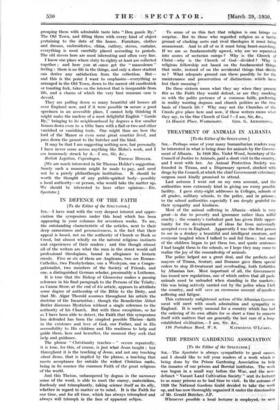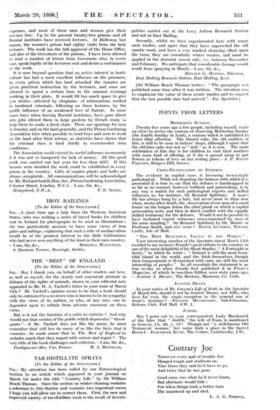THE PRISON GARDENING ASSOCIATION
[To the Editor of the SPECTATOR.]
Sin,—The Spectator is always sympathetic to good causes, and I should like to tell your readers - of a work which is being done by the Prison Gardening Association to help the inmates of our prisons and Borstal institutes. The work was begun in a small way before the -War, and the now- defunct " Vacant Land Cultivation Society " sent its lecturer to as many prisons as he had time to visit. In the autumn of 1928 the National Gardens Guild decided to take the Work up, and has now thoroughly organized it under the directorship of Mr. Gerald Butcher, J:P.
Whenever possible - a local- lecturer' is employed,- to save
expenses, and most of these riven- and women give their services free. Up to the present twenty-two prisons and all Borstal institutes have received lectures. At Holloway last season; the women's prison had eighty visits from the lady lecturer. The work has -the full approval of the Home -Office, and also of the Governors of the prisons. - I have been allowed to read a- number of letters from Governors who, in every case,speak highly of lecturers sent and desire a continuance of the --work.
It is now beyond question that an active interest in horti- culture has had a most excellent influence on the prisoners. In every prison which has land attached the inmates are given practical instruction by the lecturers, and some are allowed to spend a certain time in the summer evenings working in their plots. It would fill too much space to give you stories--attested by chaplains—of reformations worked in hardened criminals, following on these lectures, by the gentle influence of an awakened love of Nature. In some cases boys when leaving Borstal institutes, have gone direct into jobs offered them in large gardens by friends ready lo help them to make a fresh start. There are openings for men in forestry and on the land generally, and the Prison Gardening Association tries when possible to send boys and men to work on the land after their release, as statistics have shown that the criminal class is bred chiefly in overcrowded slum conditions.
The Association could extend its useful influence enormously if it was not so hampered for lack of money. All this good work was carried out last year for less than £317. If this income were doubled the work could be established in every prison in the country. Giffs of surplus plants and bulbs are always acceptable. All communications will be acknowledged by Mr. Richard Sudell, Hon. Sec., Prison Gardening Association, 9 Gower Street, London, W.C.1.—I am, Sir, &c.,















































 Previous page
Previous page